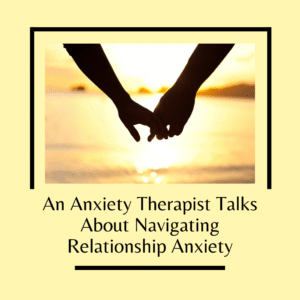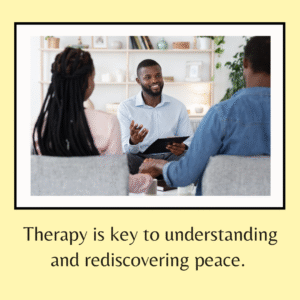 Relationship anxiety is somewhat of a broad term.
Relationship anxiety is somewhat of a broad term.
It shows up in different ways, and there are complex underlying causes and reasons why it may appear. Often, it arises due to a combination of reasons.
No matter what though, it’s uncomfortable, and may be highly disruptive to the relationship. Left unchecked, it may even end up destroying the relationship completely.
Here, we’ll be looking at three of the common ways relationship anxiety manifest. And if you experience any of them, some of the things you can do to work through it.
General Relationship Anxiety
Anxiety manifests in different ways, and for some, it lands smack-dab in their middle of their relationship. This makes it challenging for them to settle in; relax and enjoy the relationship.
They may be constantly worried something will happen to their partner. Like a car accident to another person stealing them away.
They may need excessive validation and assurance. Also they can indulge in destructive self-sabotaging behavior. Such as suppressing their wants and needs for fear of seeming disagreeable.
This type of anxiety has less to do with the relationship, and everything to do with the anxious individual. Especially when their partner is present, validating, and fully committed.
In this case, therapy is the best course of action. It provides the space and framework to examine what’s going on and find out what’s behind the anxiety. It will also help the individual strengthen their relationship with themself. Likewise, it may also be prudent to do some couples work. Which offers an opportunity to share worries and fears, and facilitate a deeper trust and connection.
People who have been cheated on in the past or who’ve had a prior partner who lied and was untrustworthy, may find it challenging to trust when entering a new relationship.
While it’s obviously unfair to hold someone responsible for someone else’s actions, it still doesn’t make it easy.
The best way to mitigate this situation is through honest communication. No one should be faulted for their feelings, and no one should be expected to be a mind-reader, either.
Vocalizing insecurities that pop up is the best way to squash them. Partners who are able to communicate openly and honestly in this way get the added benefit of forming a close bond.
Therapy can be beneficial for healing from past infidelities, and discovering how to preserve the good in the new union.
Anxious Attachment Relationship Style
You may have heard of attachment theory, and the different attachment styles in relationships. The insecure attachment styles are classified as anxious, avoidant, and dismissive avoidant.
Attachment theory took root in the 1950s, and is based on the premise that our attachment style to our romantic partners is based on the relationship formed in childhood with primary caregivers. Those with an inconsistent, abusive, and neglectful upbringing tend to have an insecure attachment style, which plays out in their dating life.
Those with an anxious attachment style tend to cling desperately in their relationships.
They often attract – and are attracted to – avoidant attachment types, and the dynamic ends up playing out miserably for both.

It’s helpful for those anxiously attached to first understand what’s going on. Then work with a therapist to heal. The goal for anyone with an insecure attachment style is to become securely attached – the healthiest form of attachment.
Rather than blame anxiety, dismiss it, or avoid it entirely, it’s helpful to recognize that it’s here to protect us.
As misguided as it may seem, we are all doing the best we can. Many of us have had things happen to us in the past that our brain is attempting to “save” us from in the future.
Therapy is key to understanding this complexity, and is the best resource available to help. It help us work through anxiousness, and rediscover peace and understanding.
If this is something you’re struggling with, our team of compassionate experts are here to help. We offer anxiety treatment in Fair Oaks and Roseville, Ca. We’re always happy to chat, hear your concerns, and offer our support.
Begin Relationship Therapy for One in Roseville, CA or Fair Oaks, CA:
If you are ready to make lasting changes in your life to strengthen your relationships with others, we can help! Our therapists are trained to provide relationship therapy for one for adults living in the Sacramento Area or online in the state of California. You can begin relationship therapy for one in Fair Oaks, CA or Roseville, CA by following these easy steps:
- Contact the Relationship Therapy Center to schedule a free 20-minute phone consultation and learn more about relationship therapy for one
- Meet with one of our relationship therapists,
- Begin relationship therapy for one and work on the skills you need to have meaningful and healthy relationships.
Other Services offered at The Relationship Therapy Center:
In addition to relationship therapy for one, Our Sacramento area therapy centers located in Roseville and Fair Oaks, CA offer a variety of mental health services for individuals and couples. Also, we provide online therapy services for people living in California so we can help you resolve your issues when it’s not possible for you to come to our office. Our relationship therapy services include: Counseling after infidelity, sex therapy, co-parent counseling, family therapy, divorce counseling, intensive couples retreats, and premarital counseling. And, our individual therapy services include, depression treatment, anxiety treatment, trauma therapy, therapy for children and teen therapy, Please contact our counseling clinic and learn more about the many ways we can help you or your loved ones heal and grow.
- Couples Therapy for Separation - January 8, 2026
- Is Couples Therapy Covered by Insurance? - December 30, 2025
- How Long Should Therapy Last? - December 24, 2025

